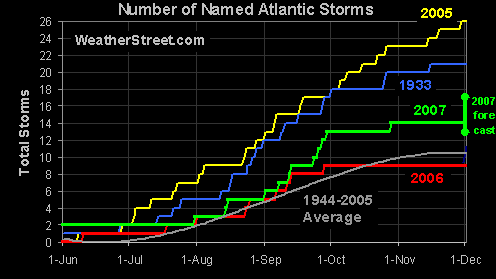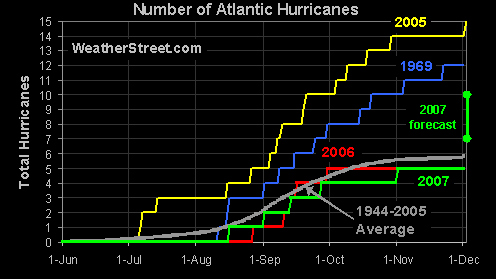2007 Tropical Season Wrap-Up
With Andrea showing up 20 days before the season started and Olga forming 10 days after it was supposedly over, the initial thought would be that this was a very active season. In fact, as far as named storms was concerned, the Atlantic basin did experience a higher than normal tropical season that met the predictions of the forecasters for overall tropical storms.
 I think it is important to recognize that the storm predictions are for the entire Atlantic Basic - The Atlantic Ocean, Caribbean Sea and the Gulf of Mexico. It is not a prediction of how many storms will hit any one area (although there were plenty of estimates in that regard as well).
I think it is important to recognize that the storm predictions are for the entire Atlantic Basic - The Atlantic Ocean, Caribbean Sea and the Gulf of Mexico. It is not a prediction of how many storms will hit any one area (although there were plenty of estimates in that regard as well).So, including Andrea and Olga, there were 15 named storms for 2007 (The graphic to the right ends at Dec 1 and does not include Olga). There were also 2 tropical depressions that failed to strengthen to Tropical Storm strength. (Source: Wikipedia). This is an above average season, while last year was slightly below average.
Now when we look at the number of hurricanes, the story is less interesting. Only 5 storms grew to hurricane strength. Two of those storms intensified to Category 5, both of which slammed into Central America around Belize, Nicaragua and Mexico's Yucatan peninsula. This count is much less than predicted.

The excitement over 2007 diminishes even more when we look at the total energy consumed by these storms. The Accumulated Cyclone Energy (ACE) index is a measure of the energy consumed by a tropical cyclone. According to Ryan Maue, PhD Candidate in Meteorology at FSU:
This is even more striking when you look at the entire northern hemisphere. (Source Ryan Maue, FSU)The 2007 Atlantic Hurricane season was below-normal and tied for 2002 as the most inactive since the El Nino depressed 1997 season in terms of storm energy [*]. When combined, the 2006 and 2007 Atlantic Hurricane Seasons are the least active since 1993 and 1994. When compared with the active period of 1995-2005 average, 2006 and 2007 hurricane energy was less than half of that previous 10 year average. The most recent active period of Atlantic hurricane activity began in 1995, but has been decidedly less active during the previous two seasons.
So for the entire northern hemisphere, Atlantic and Pacific Basins, the ACE index indicates that 2007 has been the least active season in the past 30 years. Certainly not meeting the hype from the news media that has been drilled into us since 2005's extremely active season.
The North Atlantic was not the only ocean that experienced quiet tropical cyclone activity. The Northern Hemisphere as a whole is historically inactive. How inactive? One has to go back to 1977 to find lower levels of cyclone energy as measured by the ACE hurricane energy metric. Even more astounding, 2007 will be the 4th slowest year in the past half-century (since 1958) .
Fewest Northern Hemisphere Hurricane Days since 1977. 3rd Lowest since 1958 (behind 1977 and 1973). Hurricane Days Graphic
When combined, the Eastern Pacific and the North Atlantic, which typically play opposite tunes when it comes to yearly activity (b/c of El Nino), brushed climatology aside and together managed the lowest output since 1977. In fact, the average lifespan of the 2007 Atlantic storms was the shortest since 1977 at just over two days. This means that the storms were weak and short-lived, with a few obvious exceptions. The figures below demonstrate the historic proportions of 2007 Tropical cyclone inactivity.

For two years we have heard over and over how the number and intensity of hurricanes would continually increase due to global warming. Al Gore specifically and incorrectly (dishonestly?) linked Katrina to anthropogenic global warming. Well 2006 was a complete dud and 2007 was clearly low in intensity but not in number. Yet CO2 levels are the same as they have been for the past several years. This shows that there is no clear connection between CO2 content and tropical storm occurrences. It also illustrates that the whole climate prediction concept is not accurate.
There is a big difference between the scientific predictions and analysis of Drs. Gray and Klotzbach and the hype of a overpumped media being stoked by global warming alarmists. The 2007 season was more active than average. The prediction was correct. That only five of them developed into hurricanes and only 2 caused any major damage is a good thing. Sea surface temperature certainly played a big effect with Dean and Felix growing to Cat 5 strength. Having as big or bigger effect is wind shear which, to my knowledge, is not very predictable.
As individuals, we need to be prepared for a hurricane strike and respond accordingly when appropriate but not to panic. Models and predictions give us a guideline and a glimpse into what might be. Remaining alert and actually observing the conditions around us and those coming towards us are best way to be ready for the next storm.

Storm Watch with: Outside the Beltway, Stop the ACLU, Is It Just Me?, The Midnight Sun, Rosemary's Thoughts, Stix Blog, Right Truth, Shadowscope, DragonLady's World, Stuck On Stupid, Leaning Straight Up, The Amboy Times, Chuck Adkins, Pursuing Holiness, Adeline and Hazel, third world county, Woman Honor Thyself, DragonLady's World, The Uncooperative Blogger, Pirate's Cove, Celebrity Smack, The Pink Flamingo, Stageleft, Right Voices, Blog @ MoreWhat.com, 123beta, guerrilla radio, Adam's Blog, Cao's Blog, Big Dog's Weblog, Nuke's, Faultline USA, Allie is Wired, The Crazy Rants of Samantha Burns, Walls of the City, The World According to Carl, Blue Star Chronicles, CORSARI D'ITALIA, and The Yankee Sailor, thanks to Linkfest Haven Deluxe.









<< Home